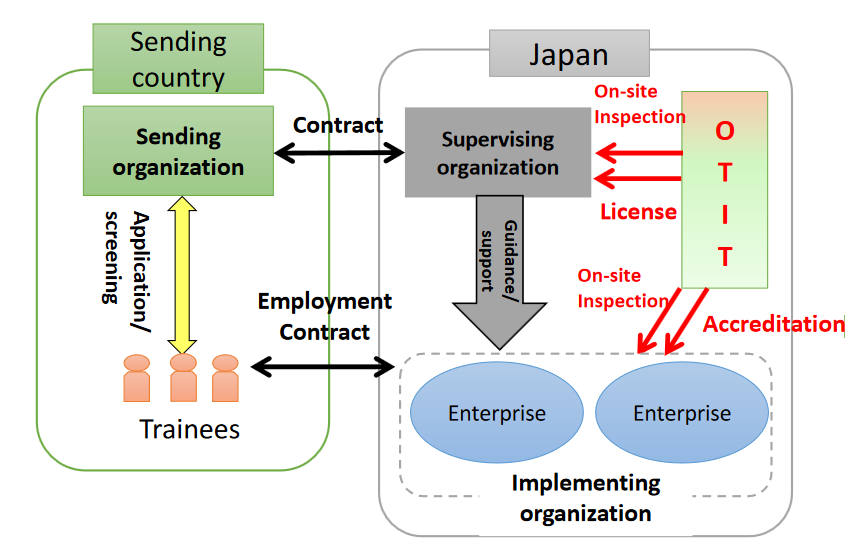Detailed Technical Intern Training Program (TITP - Japan) Guide
Overview of TITP
The Technical Intern Training Program (TITP) is a work training program providing employment opportunities for Pakistani nationals in Japan. It was established in 1993 to promote international cooperation and contribute to developing countries by transferring skills, technologies, and knowledge from Japan through on-the-job training.
A Memorandum of Cooperation (MoC) on TITP was signed between Pakistan and Japan on 26th February 2019. Under this MoC, approved Pakistani Sending Organizations can recruit, train and send qualified Pakistani youth to Japan as Technical Interns for up to 5 years.
Objectives of TITP
The key objectives of TITP are to:
- Promote international cooperation and contribute to the development of Pakistan by transferring skills, technologies and knowledge from Japan.
- Provide Pakistani youth with opportunities to gain valuable work experience and skills in Japan.
- Enable Pakistani industries to learn best practices and advanced techniques from Japanese companies.
- Strengthen economic ties and bilateral relations between Pakistan and Japan.
Key Features of TITP
- Technical Interns can work in Japan for up to 5 years in specific sectors and job categories.
- Interns receive attractive compensation, health insurance, and welfare pension in Japan.
- Opportunity to transition to the Specified Skilled Worker (SSW) visa after completing 3 years of TITP.
- Exposure to Japanese work culture, quality management and advanced technologies.
- Support for finding employment in Pakistan after returning to utilize acquired skills.
Stakeholders
The key stakeholders in TITP are:
- Ministry of Federal Education & Professional Training, Pakistan – Signatory of MoC.
- Sending Organizations in Pakistan – Approved entities for recruiting and sending interns.
- Organization for Technical Intern Training (OTIT), Japan – Regulatory authority.
- Supervising Organizations in Japan – Associations that accept and manage interns.
- Implementing Organizations in Japan – Companies that employ and train interns.
- Japan International Trainee & Skilled Worker Cooperation Organization (JITCO) – Supports program.
TITP Process (Brief)
1. KOES identifies internship opportunities with Japanese Supervising Organizations.
2. KOES recruits suitable Pakistani candidates as per eligibility criteria and job requirements.
3. Selected candidates undergo Japanese language and skills training by KOES in Pakistan.
4. Japanese Supervising/Implementing Organizations interview and select candidates.
5. Selected interns undergo visa process and pre-departure orientation by KOES.
6. KOES sends interns to Japan and provides ongoing support during the internship.
7. Interns complete up to 5 years of on-the-job training at Japanese companies.
TITP Process (Technical)
Sending Country and Organization
The process begins with a sending country and a sending organization that recruits trainees for the program.
Trainees
The trainees are individuals from the sending country who are selected to participate in the TITP program.
Employment Contract
The sending organization enters into an employment contract with the trainees, facilitating their application and acceptance into the program.
Supervising Organization
In Japan, there is a supervising organization that oversees the implementation of the TITP program. This organization establishes contracts with the sending organizations.
On-site Inspection and Licensing
The supervising organization conducts on-site inspections of the implementing enterprises in Japan to ensure compliance with the program’s regulations. It also issues licenses to these enterprises, allowing them to participate in the TITP program.
Accreditation
The supervising organization is responsible for accrediting the implementing enterprises, which is a prerequisite for their participation in the program.
Implementing Enterprises
The implementing enterprises in Japan are the organizations that directly employ and train the TITP trainees during their internship period.
Eligibility Criteria
To qualify for TITP through KOES, Pakistani candidates must:
- Be between 18 to 30 years old.
- Have completed at least high school (12th grade) education.
- Possess relevant work experience or vocational training in the desired job category.
- Clear the medical and background checks.
- Attend Japanese language classes by KOES, and preferrably attain JLPT N5 certification by giving Japanese Language proficiency test at any of the authorized exam centers.
- Demonstrate intent to utilize skills acquired in Japan after returning to Pakistan.
Language Requirements
| Sr | Visa type | Language Requirement |
|---|---|---|
| 1 | Technical Trainee Visa under Technical Intern Training Program (TITP) | (Mandatory) minimum 160-hour Japanese language training (Basic language) Note: Japanese supervising organizations usually demand 03 to 04 months training, and some organizations demand Japanese language proficiency test (JLPT) N5 passing certificate. |
| 2 | Skilled Worker Visa under Specified Skilled Worker (SSW) program | Japan Foundation Test Basic (JFT-Basic) A2 passing certificate. |
| 3 | Visa for IT/Software Engineers | There is no (mandatory) visa requirement. However, the demand of the relevant companies varies from JLPT N2 to JLPT N4 passing certificate. There are very few companies, who accept IT/Software Engineers without any JLPT certificate. |
Important point for all Working Visa categories
Japanese companies, apart from mandatory or on demand language certification, prefer applicant who know about Japanese culture, moral and work ethics.
Benefits for Pakistani Interns
- Attractive monthly salary and benefits at par with Japanese employees.
- Opportunity to learn Japanese language, work culture and advanced skills.
- Comprehensive support from KOES and Japanese organizations throughout the program.
- Pathways to longer-term employment in Japan through the SSW visa.
- Improved career prospects and societal status upon returning to Pakistan.
Sectors and Job Categories
Interns can be placed in over 80 sectors and 140 job categories under TITP, including:
- Agriculture, forestry and fishery
- Construction
- Food manufacturing
- Textile
- Machinery and metal
- Air ground handling
- Others (e.g. care workers)
A full list of Sectors and Job Categories can be viewed here: Complete list of TITP Sectors and Job Categories
How to Apply
- Check your eligibility as per the criteria.
- Enroll in Japanese language classes at KOES, if not already proficient.
- Submit an online application on the KOES website with required documents.
- Undergo screening, assessments and interviews by KOES.
- If selected, attend skills training and complete visa procedures through KOES.
- Fly to Japan once the internship is confirmed by the Japanese organizations.
For any queries, please contact the KOES team at [email protected].
FAQs
Is Japanese language proficiency mandatory for TITP?
Yes, Japanese language skills are required to work and live in Japan. KOES provides the necessary language training to selected interns.
How can I transition to the Specified Skilled Worker (SSW) visa after TITP?
Interns who complete 3 years of TITP with good standing are eligible to apply for the SSW visa, which allows them to work in Japan for up to 5 years in specified sectors.
What kind of support is provided to interns by KOES and Japanese organizations?
KOES provides end-to-end facilitation from recruitment to return, including training, documentation, and liaison with Japanese stakeholders. In Japan, interns receive support from their Supervising and Implementing Organizations for various needs.
How many foreign workers Japan allow?
In 2023, the total number of foreign workers in Japan reached a record high of 2,048,675. This is an increase of 225,950 since last year. The breakdown by nationality shows that workers from Vietnam numbered 518,364 (25.3% of the total), followed by China (including Hong Kong and Macao) at 397,918 (19.4%) and the Philippines at 226,846 (11.1%). However, this data includes all foreign workers, not just those under the TITP. Data from: nippon.com.
Kashmir Overseas Employment Services is one of the best recruitment agencies of Pakistan. Contact us if you want to hire talent from Pakistan to work on your project.


